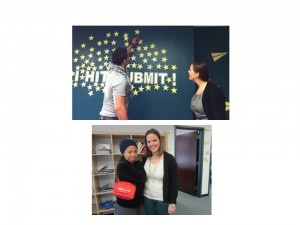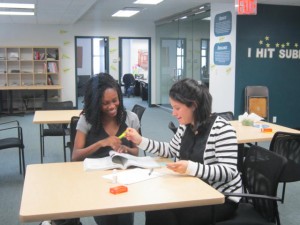It’s a fun time of year to be at Bottom Line, and I know it’s just going to get better and better. Bottom Line helped over 200 New York City students put their stars on the “I HIT SUBMIT!” wall and will continue to work with them on the path to making a responsible choice of which college to attend next year. In the midst of all this energy, we are also thinking about those students, who in just a few short months will be in our current high school seniors’ shoes. We are going to serve an additional 100 more students bringing our total to 300 high school students in the Class of 2014.
The Outreach Team has begun putting word out that we are accepting applications for the Class of 2014 in a big way. As a first-year counselor at Bottom Line, it’s been a great experience so far. We’re reaching out to school personnel with whom we already have relationships and forging new ones to expand our reach in order to help more and more eligible students. These students should live in New York City, have at least an 80 GPA, come from a low-income family, being the first generation of their family to earn a bachelor’s degree in the United States, and be U.S. Citizens or Permanent Residents.
Our current high school seniors are also spreading the word by telling their junior friends. This year, we are piloting “Student Ambassadors,” seniors who will spread the word about our program to juniors at their high schools. To date, we’ve reached out to more than 25 current seniors to see who would like to be a part of this student-led outreach approach. Then, applicants can indicate on their Bottom Line applications that they heard about our program from one of these Ambassadors. It’s a fun competition for the Ambassadors, too- whoever receives the most referrals by June 1st wins a $50 gift card!
We’ve also started doing presentations at area high schools in Brooklyn, Manhattan, and the Bronx. The Outreach Team is planning to conduct over fifteen presentations across the city to publicize our program. Our goal is to talk to juniors about the services Bottom Line provides. Additionally, we also discuss the college admissions process in general so they are better prepared as they embark on this life-directing process of college applications. Students are engaged during our presentations and ask great questions. Students learn important milestones, for example the almost universal college decision day of May 1st. After discussing all the steps along that timeline the reactions on the students’ faces are priceless. They see themselves using our help and it shows in our numbers. We’ve just begun and we’ve already had 116 students apply!
– Sonia Essaibi
Bottom Line – New York Counselor



